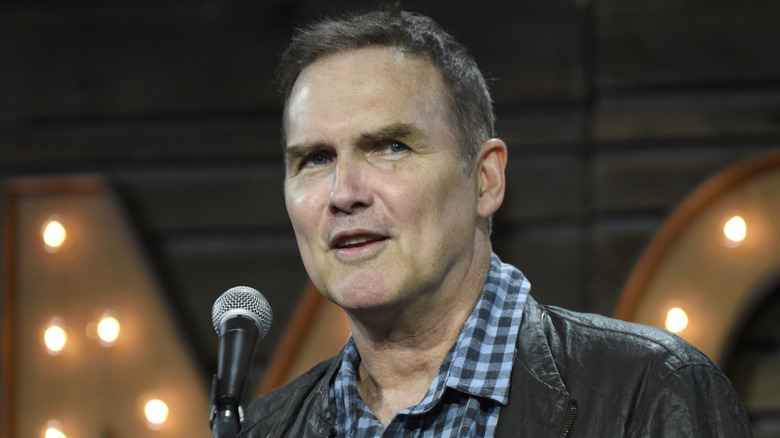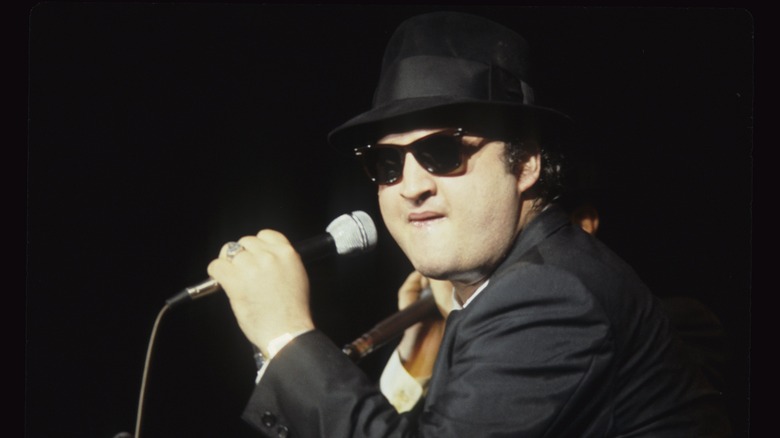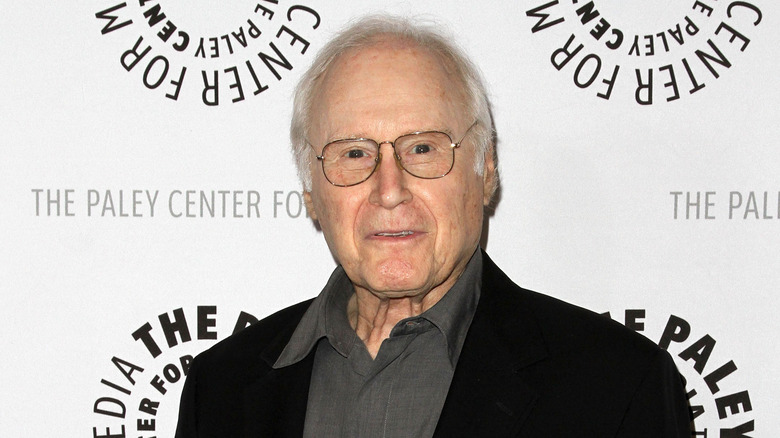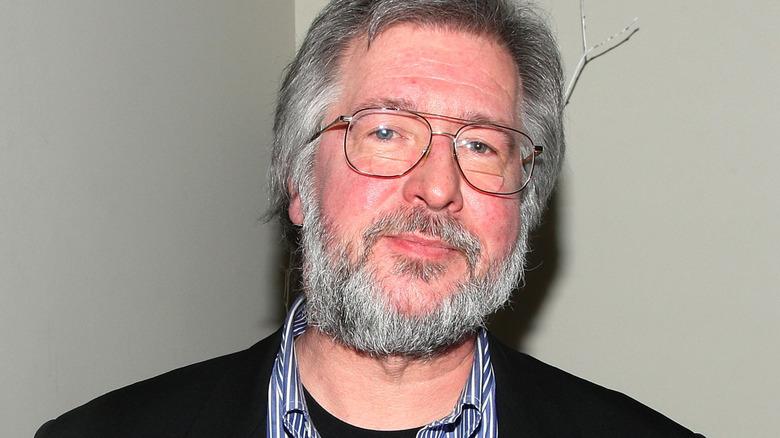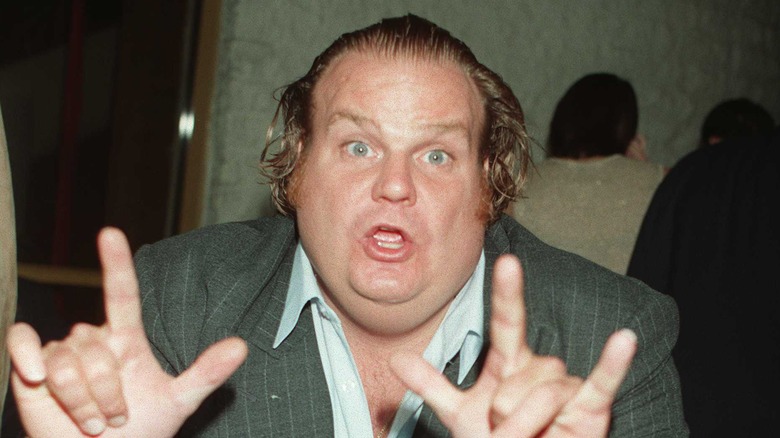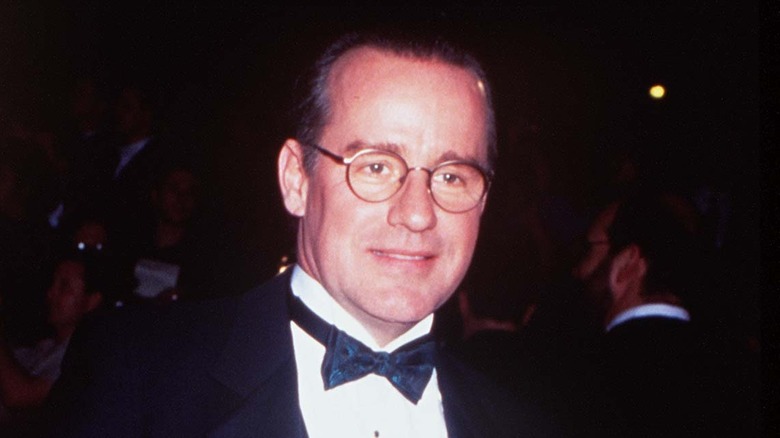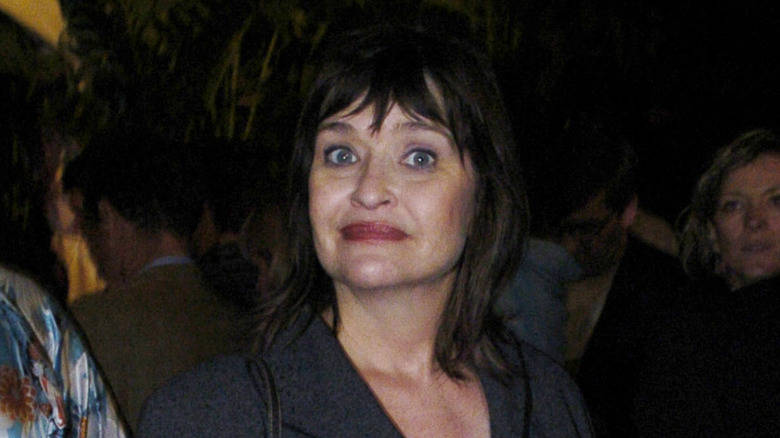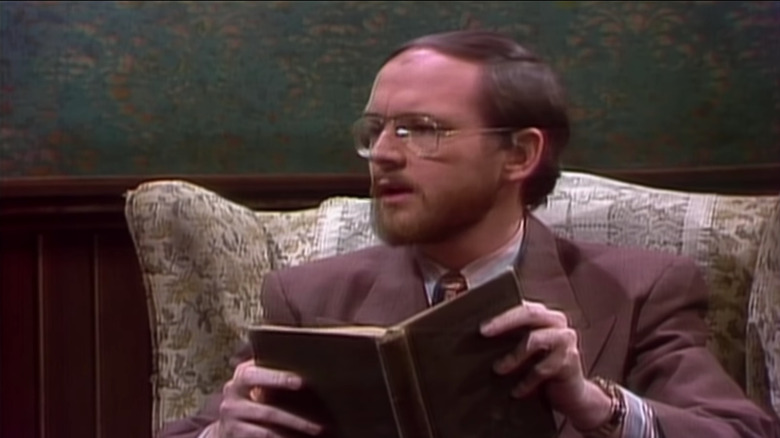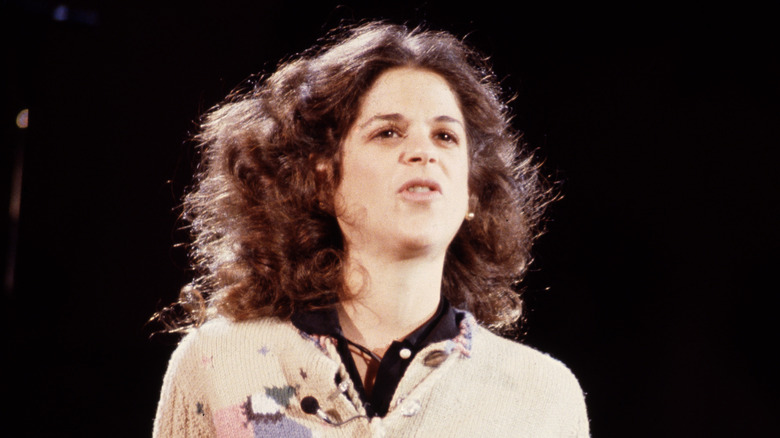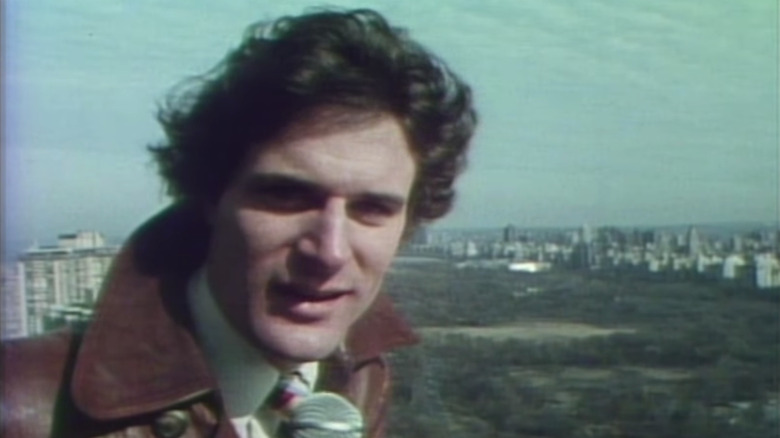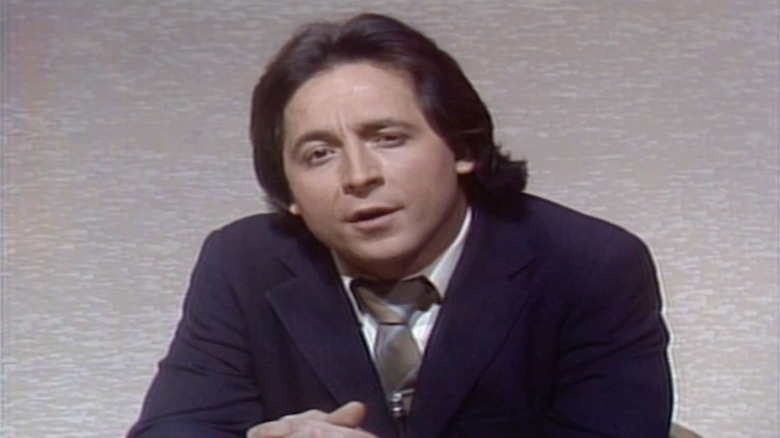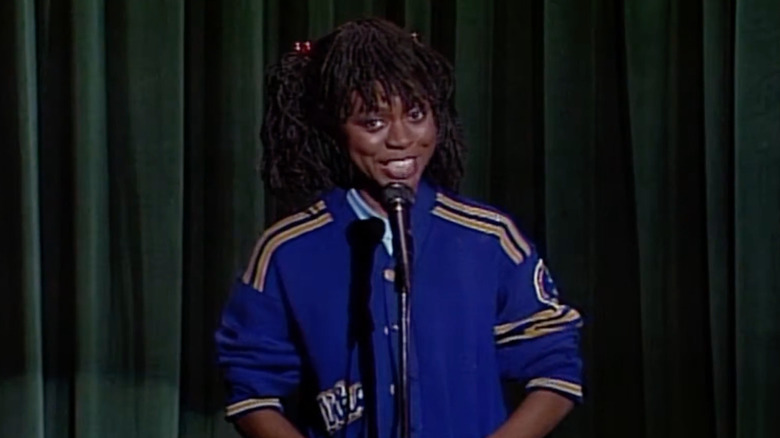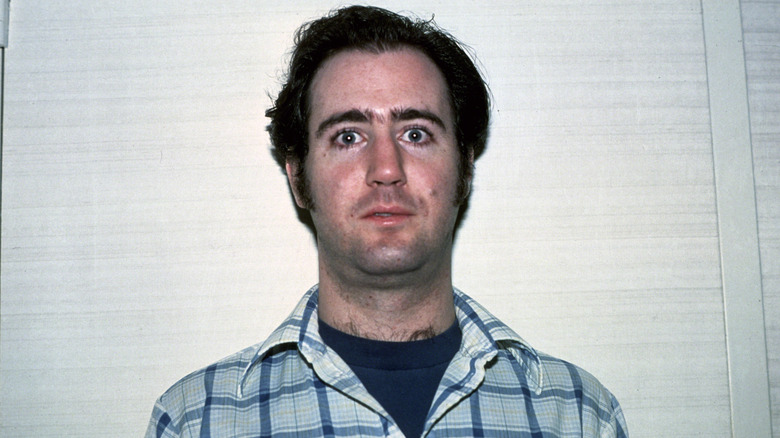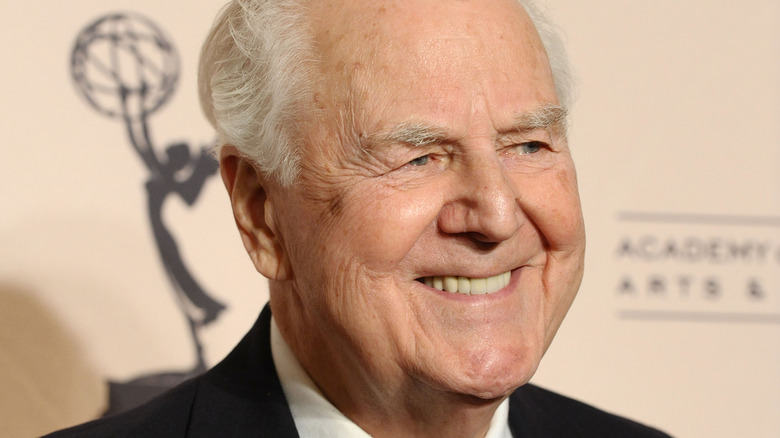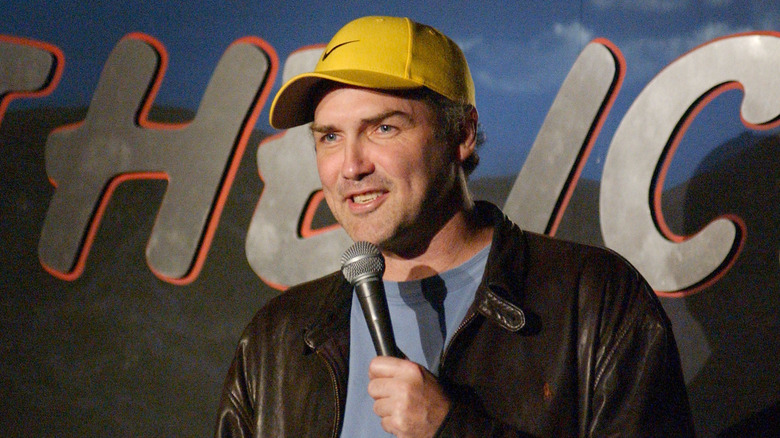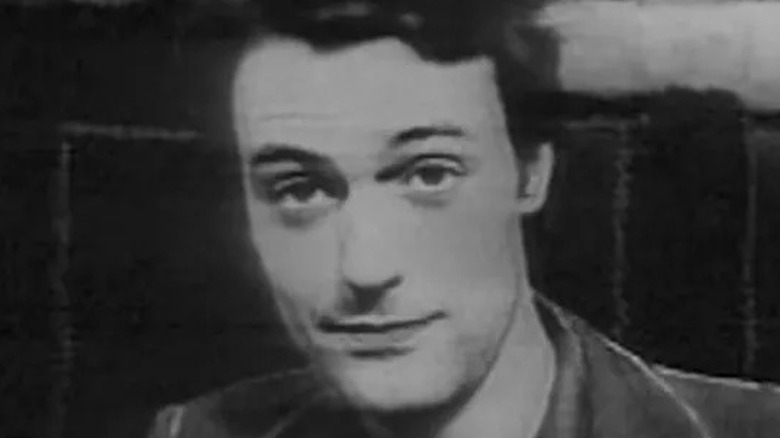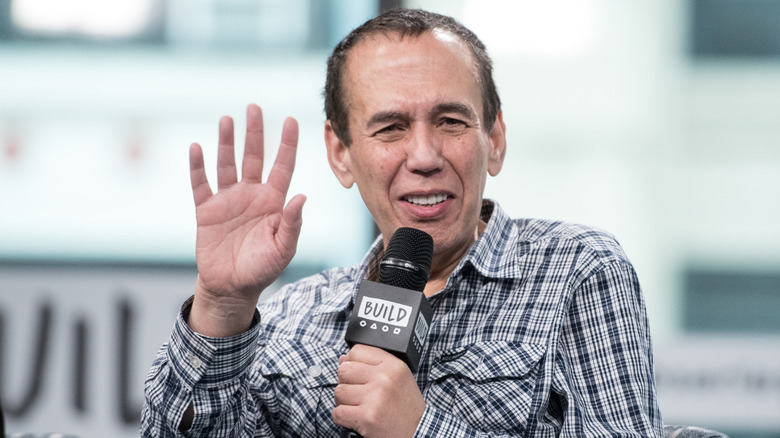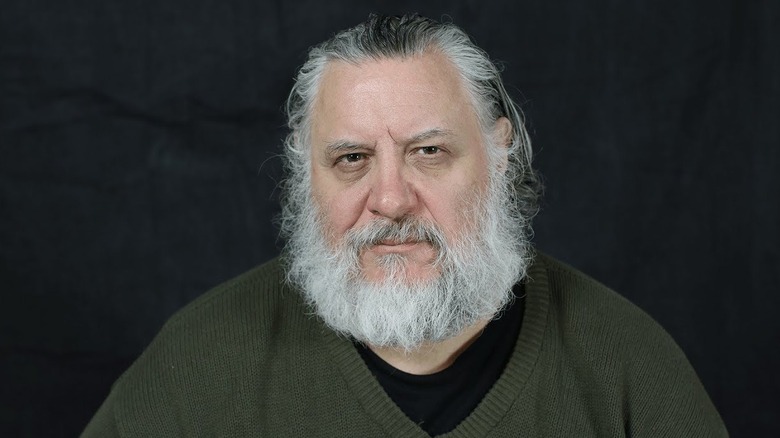SNL Actors You May Not Know Passed Away
Since its premiere in 1975, "Saturday Night Live" has been a launching pad for major comedy talent, from the original "Not Ready for Prime Time Players" to the most recent ensemble. It's also, unfortunately, been a curse for certain former cast members. There's almost a voodoo surrounding the long running sketch series, with some of its most famous performers meeting an untimely demise.
Many of these deaths have occurred under tragic circumstances. Some of the following stars have died prematurely from cancer, while others have passed away after living long, relatively healthy lives. But whatever the reason, it's always a sad day when an "SNL" alum leaves us too soon.
While some of these deaths have attracted a great deal of media attention, others have quietly slipped through the cracks, and that's a shame. They may be gone, but they certainly shouldn't be forgotten. So let's pay tribute to those "SNL" actors you may not know passed away.
The following article discusses addiction. If you or anyone you know is struggling with addiction issues, help is available. Visit the Substance Abuse and Mental Health Services Administration website or contact SAMHSA's National Helpline at 1-800-662-HELP (4357).
John Belushi
One of the original "Not Ready for Prime Time Players," John Belushi was also the first "Saturday Night Live" alum to die. It's a sad distinction to hold for a trailblazing talent who broke new ground in sketch comedy.
Belushi came up through the Chicago comedy scene, starting in the West Compass Trio before joining Second City. The "National Lampoon Radio Hour" quickly came calling, where he met some future "SNL" members. He caught the eye of Lorne Michaels, who was looking for dynamic up-and-comers to fill out his brand new late night series on NBC. Belushi joined Dan Aykroyd, Chevy Chase, Jane Curtin, Garrett Morris, Laraine Newman, and Gilda Radner for the show's first season, and comedy history was made.
From the beginning, Belushi displayed a talent for bombastic physical humor. His most famous characters included a Greek cafe owner who serves "Cheeseburgers!," a katana-wielding samurai, Henry Kissinger, Beethoven, and an angry Weekend Update contributor. Oh, and he was also one of the Blues Brothers. (He also appeared in a sadly prescient skit where an older Belushi visits the graves of his former cast mates, called "Don't Look Back in Anger.")
Belushi briefly reached movie stardom as well, thanks to major roles in "National Lampoon's Animal House" and "The Blues Brothers," an expansion on the musical sketch he performed with Aykroyd. Sadly, his struggles with drug addiction got the best of him. On March 5, 1982, Belushi died at the Chateau Marmont after injecting a deadly mixture of cocaine and heroin, known as a "speedball." He was only 33 years old.
George Coe
Although the original "Not Ready for Prime Time Players" were famously young and unknown, there was one veteran performer amongst the bunch: 46-year-old George Coe, who was only credited for the premiere episode but appeared sporadically throughout the first season.
"SNL" was far from Coe's most famous acting credit. He got his start in Broadway, appearing in the original production of "Mame" opposite Angela Lansbury and starring as David in the first staging of "Company." He earned an Oscar nomination for his short film "The Dove" (1968), an Ingmar Bergman parody. His acting credits were wide and varied, including roles on the silver screen in "Kramer vs. Kramer," "Remo Williams: The Adventure Begins," and "The Mighty Ducks," and on television with appearances in "Columbo," "Murder, She Wrote," "Curb Your Enthusiasm," and "The West Wing," to name a few.
But he's perhaps best known to modern audiences for voicing the oft-abused butler Woodhouse in "Archer," which he did for four seasons. Coe died at the age of 86 on July 18, 2015, after a long illness. "Archer's" eighth season — which, appropriately enough, revolved in part around Woodhouse's death — was dedicated to him.
Tom Davis
Tom Davis spent the better part of four decades as a writer at "SNL," starting with the first season in 1975 and continuing on an on-again, off-again basis until 2003. During that time, he won three Emmys and helped develop some of the show's best sketches, including "Nick the Lounge Singer" with Bill Murray, "The Continental" with Christopher Walken, "Theodorick of York, Medieval Barber" with Steve Martin, and "The Coneheads" with Dan Aykroyd and Jane Curtin.
His talents weren't just limited to his writing. David also appeared on camera a number of times, most notably with writing partner Al Franken as the comedy duo "Franken and Davis." He also provided the voice of a hippie who President Jimmy Carter (Aykroyd) talks down from an acid trip in a memorable segment called "Ask President Carter."
Davis died of throat and neck cancer on July 19, 2012, at the age of 59. Sardonically witty up to the very end, he wryly referred to his death as his "deanimation."
Chris Farley
Like his hero John Belushi, Chris Farley's flame burned brightly and briefly. Just like Belushi, Farley cut his teeth in Chicago's Second City Theater before landing a spot on "Saturday Night Live." And just like his idol, the young comic died of a drug overdose at the age of 33, after several attempts at getting sober.
Farley burst onto the scene like a comedic hurricane. His wild man antics led to him becoming known as one of the "Bad Boys of 'SNL,'" which included fellow cast members Adam Sandler, David Spade, and Chris Rock. His signature characters included un-motivating motivational speaker Matt Foley (you know, the one who lived in a van down by the river), Chicago sports fan Todd O'Connor of Bill Sweski's Superfans ("Da Bears”), and a Chippendales dancer competing against Patrick Swayze. And let's not forget his appearances as a dancing lunch lady, a "Gap Girl," and host of "The Chris Farley Show."
At the time of his death, Farley had a burgeoning film career, with starring roles in "Tommy Boy" and "Black Sheep" opposite Spade. He was also the lead in "Beverly Hills Ninja" and made memorable appearances in "Billy Madison," "Coneheads," and "Wayne's World." His final two films, "Almost Heroes" and "Dirty Work," were released after his death.
It's hard to know how high Farley's career would've soared had his life not been cut tragically short on December 18, 1997. But his presence in comedy is sorely missed, as Sandler memorably summed up in a musical tribute to his late friend when he returned to host "SNL" in 2019.
Phil Hartman
Phil Hartman's untimely death sent shockwaves throughout the entertainment industry, with the lurid details obscuring the tragedy at its center.
Hartman, who got his start in The Groundlings before playing Captain Carl on "Pee-Wee's Playhouse," was a steady hand on "Saturday Night Live" from 1986 through 1994. Though he had his fair share of memorable characters — from Unfrozen Caveman Lawyer to Eugene, the Anal Retentive Chef — it was his impersonations that made him one of SNL's most dependable performers. His uncanny imitations of Presidents Bill Clinton and Ronald Reagan, First Lady Barbara Bush, performers Charlton Heston and Frank Sinatra, and talk show personalities Phil Donahue and Ed McMahon were favorites throughout his tenure. You could count on Hartman appearing in multiple sketches each week, with several cast members nicknaming him "Glue" for how he held the show together.
Things weren't held together so tightly at home, however. Hartman's third wife, Brynn Hartman, struggled with drug addiction and mental health issues throughout their marriage. On May 27, 1998, Brynn fatally shot her husband to death before turning the gun on herself. He was only 49 years old.
At the time of his death, Hartman was making regular appearances as Troy McClure and Lionel Hutz on "The Simpsons" and had a starring role on the sitcom "NewsRadio" as self-centered news anchor Bill McNeal. He had also appeared in such hit films as "Jingle All the Way" and "Small Soldiers." His loss was felt immeasurably, especially at Studio 8H: shortly after his death, "SNL" paid tribute by re-airing his classic "Love is a Dream" sketch, featuring his frequent scene partner Jan Hooks.
Jan Hooks
Jan Hooks was one of "SNL's" MVPs throughout the '80s and early '90s, when Lorne Michaels returned and revamped the cast with stars like Dana Carvey, Kevin Nealon, Victoria Jackson, and Jon Lovitz.
Born in Atlanta, Hooks cut her teeth at the Groundlings comedy troupe in Los Angeles before moving over to "SNL." She performed most memorably as Candy Sweeney of "The Sweeney Sisters" (opposite Nora Dunn) and perfected a wide range of uncanny impersonations, including Hillary Clinton, Nancy Reagan, and Tammy Faye Bakker opposite Hartman's Bill Clinton, Ronald Reagan, and Jim Bakker (oh, and also Ivana Trump to Hartman's Donald Trump). And let's not forget her Diane Sawyer characterization, which came in handy during election cycles.
Hooks left the series in 1991 for the shorter hours of a network sitcom, taking a starring role in "Designing Women." She earned an Emmy nomination for her recurring role as Vicki Dubcek on "3rd Rock from the Sun" and memorably played Jenna's trailer park mom on "30 Rock." She also voiced Apu's wife Manjula on "The Simpsons."
Her life was cut tragically short by throat cancer, which she died of at age 57 on October 9, 2014. On October 11, "SNL" paid tribute to Hooks by re-airing "Love is a Dream," a memorable sketch featuring her and Hartman that also re-aired after his death in 1998.
Michael O'Donoghue
Michael O'Donoghue might not be the most recognizable former "SNL" cast member, but his impact on the series was no less sizable than anyone else's. O'Donoghue was the show's first head writer, helping shape the irreverent, politically-tinged sketches the late night series would become famous for, and winning two Emmys in the process.
He also appeared in the show's very first sketch, playing an English teacher who drops dead of a heart attack while instructing his student (John Belushi) to repeat nonsense phrases. He made later appearances as a Vegas-style nightclub performer who does screeching impressions of celebrities Mike Douglas and Tony Orlando getting needles plunged in their eyes, and as Mr. Mike, host of "Mr. Mike's Least-Loved Bedtime Stories."
Before joining SNL, O'Donoghue was a founding writer for "National Lampoon." He also co-wrote the holiday classic "Scrooged" and made appearances in such films as "Manhattan" and "Wall Street." After years of suffering chronic migraines, O'Donoghue died of a cerebral hemorrhage on November 8, 1994, at the age of 54.
Gilda Radner
Gilda Radner shot to stardom as one of the original "Saturday Night Live" cast members, and sadly, her brilliance was cut short by premature death.
Radner got her start in theater with the 1972 production of "Godspell," which led to her joining The Second City troupe in Toronto. She became a featured player on the "National Lampoon Radio Hour," where she met some of her future "SNL" cast mates, including John Belushi, Chevy Chase, and Bill Murray. Lorne Michaels quickly snatched her up to join the "Not Ready for Prime Time Players," and she became one of the burgeoning sketch show's standouts.
She displayed a knack for creating memorable characters, from personal advice expert Rosanne Roseannadanna to Barbara Walters parody Baba Wawa, to NYC reporter Rose Ann Scamardella and elderly "Weekend Update" correspondent Emily Litella. Her work on "SNL" brought her an Emmy in 1978, and she moved to Broadway in 1979 with her one woman show "Gilda Radner — Live from New York," which was later filmed by Mike Nichols and released as "Gilda Live!"
A movie career was the next logical step, and she had starring roles opposite her husband, Gene Wilder, in "Hanky Panky," "The Woman in Red," and "Haunted Honeymoon." Unfortunately, her battle with ovarian cancer put an end to that. Although she had a period of remission (during which she made a memorable guest appearance on "It's Garry Shandling's Show"), she died of the illness on May 20, 1989. She was only 42 years old. Later that same night, "SNL" host Steve Martin paid tribute to Radner in his opening monologue, replaying a classic 1978 sketch where the two parodied Fred Astaire and Cyd Charisse in "The Band Wagon."
Charles Rocket
Charles Rocket joined "SNL" during the infamous 1980-81 season, when Jean Doumanian took over as executive producer from Lorne Michaels following the exit of the original cast. There were few standout moments from that year, but Rocket provided a few with his roving reporter segment "The Rocket Report." He also hosted "Weekend Update" and impersonated Ronald Reagan, Prince Charles, and David Rockefeller.
He's best remembered, however, for a notorious moment that ran afoul of the FCC. In an episode hosted by "Dallas" star Charlene Tilton, Rocket starred in a segment that sent up the famous "Who Shot J.R.?" episode, with Rocket getting shot by an unseen sniper. During the closing moments, Tilton asked him what it was like getting shot. His response: "Oh man, it's the first time I've ever been shot in my life. I'd like to know who the f*** did it."
Rocket was dismissed by incoming producer Dick Ebersol shortly thereafter. His career rebounded with roles in such films as "Earth Girls Are Easy," "Hocus Pocus," and "Dumb and Dumber." On October 7, 2005, Rocket was found dead at his Connecticut home. He was 56 years old.
Tony Rosato
Tony Rosato joined "Saturday Night Live" during the tumultuous early '80s, when producer changes and cast shakeups were frequent. Dick Ebersol replaced Jean Doumanian with the 1981-82 season, and quickly began poaching talent from the Canadian "SNL" alternative "SCTV," namely Rosato and Robin Duke (he wasn't as successful wooing the likes of Catherine O'Hara, John Candy, or Andrea Martin).
His time on "SNL" was short-lived, but he did manage to fit in a few choice impersonations — including Captain Kangaroo and Ed Asner. Rosato left after just one season, and worked steadily in television and voice-over, most notably portraying Luigi in various "Super Mario Brothers" adaptations.
Rosato suffered from mental health issues which caused him to believe his wife and child had been abducted by imposters. He was arrested and charged with criminal harassment, and he spent two years in a maximum security prison before being transferred to a mental institution for another two years. On January 10, 2017, Rosato died of a heart attack at the age of 62.
If you or someone you know needs help with mental health, please contact the Crisis Text Line by texting HOME to 741741, call the National Alliance on Mental Illness helpline at 1-800-950-NAMI (6264), or visit the National Institute of Mental Health website.
Danitra Vance
Although her tenure on "SNL" was brief, Danitra Vance made history when she joined the series in 1985. She was the first Black woman to become a repertory player, and only the second lesbian cast member after Denny Dillon's brief tenure during the infamous Jean Doumanian season (1980-1981).
Vance was let go from "Saturday Night Live" following the end of the 1986 season, due in large part to major casting shake-ups throughout the then-struggling series. During her time there, she popularized a "That Girl" parody sketch titled "That Black Girl," playing a Black actress trying to hit the big time. She also played teenage mother and motivational speaker Cabrini Green Jackson, and excelled at impersonations of Diahann Carroll, Cicely Tyson, and Leslie Uggums.
After leaving "SNL," Vance continued acting on the stage and screen, winning an Obie and NAACP Award for the Zora Neale Hurston theatrical production "Spunk" and earning an Independent Spirit Award nomination for "Jumpin' in the Boneyard." Sadly, her career was slowed when she was diagnosed with breast cancer, which ultimately she died of on August 21, 1994.
Andy Kaufman
Andy Kaufman was never a regular cast member on "Saturday Night Live," but he was around at the very beginning: This genius, subversive comedian featured on the sketch show's first season, appearing 14 times. He played a character called Foreign Man, who became the basis for Latka Gravas in the beloved sitcom "Taxi," Kaufman's best-known character. He was no longer on "SNL" by the time "Taxi" debuted — he was voted off as part of a bizarre call-in gimmick during the 1982 season. Almost 400,000 viewers called in and Kaufman was cast off the show by a margin of 25,000 votes. He never again appeared on "SNL."
Kaufman was also known for his avant-garde comedy and performance art, regularly touring clubs and late night shows outside of his other TV work. He was so famous for his strange comedy (and refusal to outline where reality met fiction) that many fans believed — and still believe to this day — that he faked his own death of lung cancer in 1984. According to his publicist at the time, Estelle Endler, Kaufman was not only a non-smoker, but also a health food enthusiast, which added to the mystery. The idea of an otherwise healthy non-smoker dying of lung cancer at the age of 35 was very hard to believe, but, sadly, it's true.
Don Pardo
"Saturday Night Live" announcer Don Pardo was 96 years old when he died in 2014. He had already enjoyed a rich and substantial career on TV prior to his work on "SNL" (he even announced John F. Kennedy's assassination on NBC), but as soon as he was hired by creator Lorne Michaels to serve as the show's announcer in 1975, his voice became synonymous with the beloved sketch show, missing just one season. At the top of each show, Pardo announced the cast members of "SNL" as well as the week's host and musical guest.
Pardo retired from most of his announcing work for NBC in 2004, but Michaels asked him to continue announcing for "Saturday Night Live." He recorded these remotely from Arizona for a time, but ended up coming back to New York so her could carry on doing the announcements live. He actually appeared on the show in 2008 to celebrate his 90th birthday, blowing out the candles on his birthday cake. He continued to slowly step away from "SNL" over the next few years until peacefully passing away in his sleep at his home in Tucson.
Norm Macdonald
Former "Saturday Night Live" star Norm Macdonald died of cancer in 2021. The beloved comedian kept his diagnosis a secret for nine years, refusing to make it public so as not to interfere with his work. Macdonald was a cast member on "SNL" for five years from 1993 to 1998. In that time, he served up hilarious impressions of prominent figures like Quentin Tarantino, Burt Reynolds, and Bob Dole, and he was the sole anchor for Weekend Update from 1994 to 1997. Macdonald played Burt Reynolds in one of his most popular "SNL" sketches ("Celebrity Jeopardy"), but it was his work on Weekend Update that resonated most with audiences, especially his coverage of the O.J. Simpson trial.
Macdonald never shied away from controversy or dark truths, and even after his time on "Saturday Night Live" (which came with a lot of ups and downs) he continued to push boundaries and provoke thought with his stand-up comedy. He was an important voice not just on "SNL," and not just in comedy, but in the world as a whole, and he is sorely missed — Macdonald's death was devastating for those that followed him throughout his career and for those that knew him personally. "Norm was the most completely original person I have ever met," Conan O'Brien said (via The Washington Post) following Macdonald's death at the age of 61.
Peter Aykroyd
When someone hears the name Aykroyd in the same sentence as "Saturday Night Live," they're understandably going to think about Dan Aykroyd, one of the show's founding cast members and a comedian who, after a stellar run on "SNL," found huge success in film. But Dan Aykroyd is not the only Aykroyd who worked on "SNL" — his brother, Peter, was a writer and actor on the show for one year between 1979 and 1980. While he didn't make a huge impression as a featured player, he did star in a memorable short called "Java Junkie" that aired on "SNL" while he worked there (and once again in 2021 as an homage to him after his passing).
In a tribute X post following his death, Dan Aykroyd referred to his brother as "brilliant, inventive, funny, and big-hearted," and cited his many skills in comedy, writing, and music. Peter remained largely out of the spotlight following his time on "SNL," though he did pop up in a few of his brother's films, including "Conehead" and "Spies Like Us." The siblings also co-wrote the 1991 comedy "Nothing but Trouble." Peter was perhaps best known for creating the Canadian sci-fi series "PSI Factor: Chronicles of the Paranormal" alongside Christopher Chacon, which Dan hosted.
Gilbert Gottfried
There are few voices more universally recognizable than that of actor and stand-up comedian Gilbert Gottfried, who had an uncanny ability to sound both intentionally obnoxious and confidently unconcerned, using vocal emphasis with comedic precision and timing. Gottfried's grating tones would probably be recognized by many as Iago from the Disney movie "Aladdin," but that's just one tiny part of his Hollywood legacy. When news of Gottfried's devastating death from an undiagnosed heart issue broke in 2022, the world lost a comedy giant.
Gottfried was only a cast member on "SNL" for a short time, appearing during its truncated sixth season. Anyone familiar with the history of "Saturday Night Live" might be aware that Season 6, the 1980-1981 season, is also known as the Jean Doumanian year. After Season 5, creator Lorne Michaels left alongside the entire cast and all but one member of the writing staff, so it was up to Doumanian to rebuild things. Unfortunately for her, many people felt she did a terrible job, and a lot of the people she hired as writers and cast members paid the price for it alongside her, including a young Gilbert Gottfried.
Gottfried was a great stand-up, having started at open mic nights when he was only fifteen years old, and that's why he was hired for "SNL." He had not yet cultivated his famous voice, though, and went largely unnoticed during his time on the show. Luckily for comedy-lovers, he still had a wonderful career filled with many film and TV roles as well as some successful runs in stand-up comedy.
Dan Vitale
Dan Vitale passed away in 2022 at the age of 66, and his death might have gone unnoticed if not for the likes of Marc Maron, who called him the "real deal" in a tribute X post. It's unlikely that even the most dedicated of "Saturday Night Live" fans would immediately recognize his name. A cast member during the 1985-1986 season, Vitale was funny and talented, but his own personal demons prevented him from success on "SNL" and in comedy in general.
A 2014 Vulture profile revealed that Vitale struggled with addiction issues, most likely derived from his very troubled childhood with an alcoholic mother and a father he believed to be associated with the mob. Vitale also lost his sister in a car accident when he was only 13. It makes sense that he couldn't quite function well enough for stardom considering what he had to deal with, and that he was unable to make a lasting impression during his two months as a featured player on "Saturday Night Live."
After being fired from "SNL" for his drug and alcohol addiction, Vitale attended rehab and continued to perform stand-up on New York City's comedy club circuit. While he wasn't even mentioned in "Live from New York: The Complete, Uncensored History of Saturday Night Live as Told by its Stars, Writers, and Guests," Vitale had no hard feelings, telling Vulture, "I got into the candy store – I didn't get up the ladder to that nice jar – but I got into the store."
